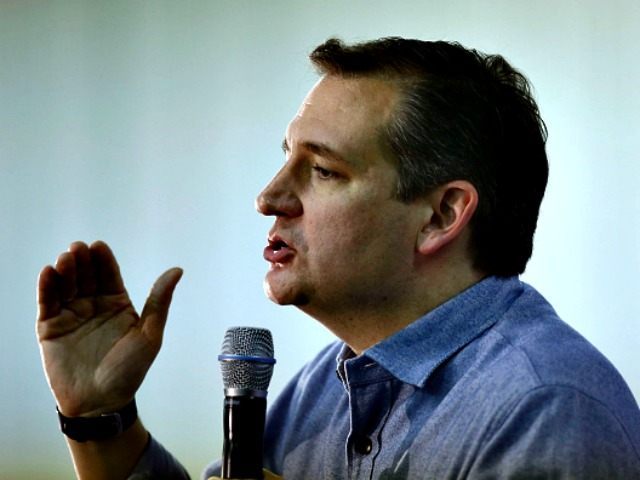Fans of Ted Cruz are buzzing about his encounter with an angry farmer worried that the Senator’s stance against ethanol would ruin his livelihood.
It might be a bit of a stretch to say that Cruz completely won the man over, or converted him into a supporter – much is made of the gentleman’s wish that Cruz find the votes he needs among Iowa farmers, but that might have just been polite best wishes, or even a dash of cynical humor.
Still, Cruz acquitted himself well during the encounter, spending some five minutes in patient, thoughtful conversation with someone who came to give him hell. Cruz made informed arguments, demonstrated a clear mastery of his subject, turned a hostile encounter cordial, and kept the political balloon juice to a minimum. He is a politician, mind you, but most of them can’t get through a conversation of this length without dissolving into a mass of vague promises and bumper-sticker slogans.
Isn’t this what voters always say they want – a serious discussion of the issues, and a politician standing on principle when he knows his refusal to deliver an easy pander is costing him votes?
Cruz published an op-ed in the Des Moines Register early in January, which expands on the point he makes about the RFS (Renewable Fuel Standard) he makes to the Iowa farmer during this conversation. In fact, four weeks later, he quotes the points he made in this op-ed to the farmer almost word-for-word:
My view on energy is simple: We should pursue an “all of the above” policy. We should embrace all of the energy resources with which God has blessed America: oil and gas, coal, nuclear, wind, solar, and biofuels and ethanol. But Washington shouldn’t be picking winners and losers.
That’s why my tax plan ends all energy subsidies and mandates. No Washington favoritism for oil and gas, for wind, for solar, or for anyone else. We should phase out the Renewable Fuel Standard, end all energy subsidies, and ensure a level playing field for everyone. Right now, oil-and-gas producers can immediately expense their drilling costs; my tax plan allows every business, regardless of industry, to do the same thing.
The lobbyists’ sole focus is on the RFS, because as long as there is a federal government mandate, Washington remains front and center. Under a Cruz administration, that would change.
He also wrote about the “blend wall” discussed in the above video clip in much greater detail, which should prove helpful for those unfamiliar with the concept:
Right now, the EPA — through regulations on fuels used in vehicle emissions tests — imposes a hard wall against mid-level ethanol blends, such as E25 (25 percent ethanol, 75 percent gasoline), making it largely illegal to sell gasoline with higher blends of ethanol.
Because of this EPA wall, the market is currently dominated by low-level ethanol blends, such as “E10” (10 percent ethanol and 90 percent gasoline). That has prevented mid-level ethanol fuels, such as E25 or E30, from widely reaching American consumers.
If allowed full market access, mid-level ethanol products like E25 or E30 could prove quite popular with American consumers, who are increasingly concerned with fuel economy. Ethanol is an effective fuel additive because it increases octane and decreases harmful tailpipe emissions. And because ethanol often costs less than other octane additives, ethanol blends can be a win-win for automakers and consumers alike.
When the mind-boggling failure of Barack Obama’s ridiculous “green energy” subsidies became apparent, many on the Left fell back to the argument that Big Oil gets a lot of subsidies too, so it wasn’t outrageous to throw a few billion taxpayer dollars at windmills, solar panels, and biofuel.
This argument completely misses the signature difference between fossil fuels and “green energy,” namely that fossil fuel works, and people want to buy it. The green energy market, as currently construed, is almost entirely a figment of the State’s imagination, created with massive subsidies and anti-competitive regulations.
Cruz takes the pushback against Big Oil seriously, and argues that all of the subsidies and regulations should be stripped away, giving biofuels and other alternative energy sources a fair shot at a truly open market. Isn’t that what all the green energy defenders have been saying they wanted, when the complained about the unfair preferences given to Big Oil?
What’s more, Cruz is brimming with confidence that ethanol can win in that free market, once both subsidy crutches and regulatory hobbles have been removed.
That free market would also have less room for political sharks and lobbyist remora, as Cruz explained to Chuck Todd on NBC’s Meet the Press this weekend. When Todd asked about Iowa Governor Terry Branstad coming out against him over ethanol, Cruz replied:
His son is a lobbyist who makes hundreds of thousands of dollars on lobbying ethanol. His family makes a ton of money.
The lobbyists very much want to keep Iowa focused on the ethanol mandate, because it keeps Iowa dependent on Washington.
It means every year they have to go back to Washington and maintain the mandate, lobbyists get paid, politicians get paid. I’m going to eliminate all the subsidies. No subsidies for oil and gas, no subsidies for anybody.
At some point, this country is going to have to choose between the energy, prosperity, and occasional injury from spirited free competition… and a grim socialist future of individuals, groups, and state governments viciously screwing each other for crumbs from the collectivist federal table. The last chance to make that choice may very well be upon us.

COMMENTS
Please let us know if you're having issues with commenting.